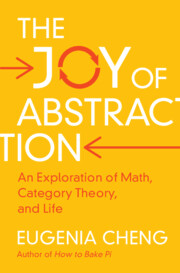Book contents
- Frontmatter
- Dedication
- Contents
- Prologue
- Part One Building up to Categories
- Interlude A Tour of Math
- Part Two Doing Category Theory
- 14 Isomorphisms
- 15 Monics and epics
- 16 Universal properties
- 17 Duality
- 18 Products and coproducts
- 19 Pullbacks and pushouts
- 20 Functors
- 21 Categories of categories
- 22 Natural transformations
- 23 Yoneda
- 24 Higher dimensions
- Epilogue Thinking categorically
- Appendices
- Glossary
- Further Reading
- Acknowledgements
- Index
18 - Products and coproducts
from Part Two - Doing Category Theory
Published online by Cambridge University Press: 13 October 2022
- Frontmatter
- Dedication
- Contents
- Prologue
- Part One Building up to Categories
- Interlude A Tour of Math
- Part Two Doing Category Theory
- 14 Isomorphisms
- 15 Monics and epics
- 16 Universal properties
- 17 Duality
- 18 Products and coproducts
- 19 Pullbacks and pushouts
- 20 Functors
- 21 Categories of categories
- 22 Natural transformations
- 23 Yoneda
- 24 Higher dimensions
- Epilogue Thinking categorically
- Appendices
- Glossary
- Further Reading
- Acknowledgements
- Index
Summary
In this chapter we cover the more advanced universal properties of products and coproducts. We define products directly and then show that this is a terminal object in a more complicated category, the category of cones over the pair of objects in question. This enables us to immediately deduce a uniqueness result. We show that, in Set, cartesian products are categorical products, and examine what uniqueness means. We show that, inside a poset expressed as a category, products are given by least upper bounds. We examine products of posets, and show that this gives us the categories of privilege; we also examine products of monoids and of groups. We then define coproducts as the dual concept, before unraveling this to get a direct definition. We show that, in Set, disjoint unions are coproducts, and we mention decategorification and relationship between categorical (co)products and arithmetic. We show that coproducts in posets are greatest lower bounds, and the coproducts of posets work but coproducts of tosets in general do not, and that coproducts of monoids exist but are much harder than products. We briefly mention coproducts of topological spaces and of categories.
- Type
- Chapter
- Information
- The Joy of AbstractionAn Exploration of Math, Category Theory, and Life, pp. 237 - 269Publisher: Cambridge University PressPrint publication year: 2022



